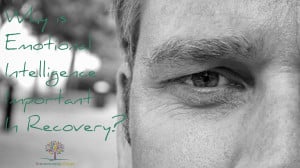Emotional intelligence refers to how well people read, understand and communicate with others, as well as how effectively they control their emotions. For individuals in recovery, practicing emotional intelligence can be incredibly healingas these individuals may depend on their addiction to process difficult emotions. The temporary relief provided by substances (or other forms of self-harm) will prevent individuals from appropriately accessing their emotions — and from developing an honest self-awareness.

Recovering from a habitual and harmful physical behavior can be relatively simple compared with the ongoing process of nurturing emotional fortitude. It is, however, a worthy process. Even those who aren’t dealing with mental health issues benefit greatly from developing insight into emotional intelligence. It increases a person’s potential for success in their relationships and career and positively influences their physical and mental health as well.
As children, people are equipped to respond emotionally before even capable of responding intellectually. The range of emotions such as fear, disgust, hate, envy, longing, hope, trust, empathy, compassion and love are responses from the brain, triggered by the amygdala, which acts as the brain’s security alarm system.Thanks to the amygdala, people have the ability to react without thinking in emergency situations or when they feel threatened.
This same pattern also explains habitual responses to challenging emotions which individuals in recovery may face, and without their knee-jerk coping skill.Meditation can be an invaluable toolin promoting an ability to manage emotions. It enhances the ability to rise above the emotional noise, allowing people in recovery to choose to respond accordingly to life’s curveballs rather than simply react to them.
Treatment Can Be Life Changing. Reach out today.
Whether you are struggling with addiction, mental health or both, our expert team is here to guide you every step of the way. Don’t wait— reach out today to take the first step toward taking control of your life.
Emotional intelligence is built a day at a time by learning to understand emotions instead of run from them. It is an ongoing process, with no end date and with a learning curve, so don’t feel overwhelmed when you feel youremotions are controlling you instead of vice versa. Tolerance of others and self is a good place to start. Practice being forgiving and patient, responding to life’s challenges with thoughtfulness and serenity.






